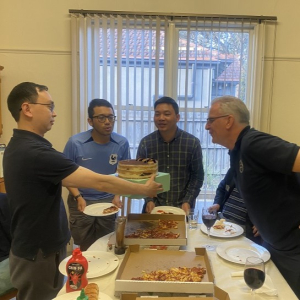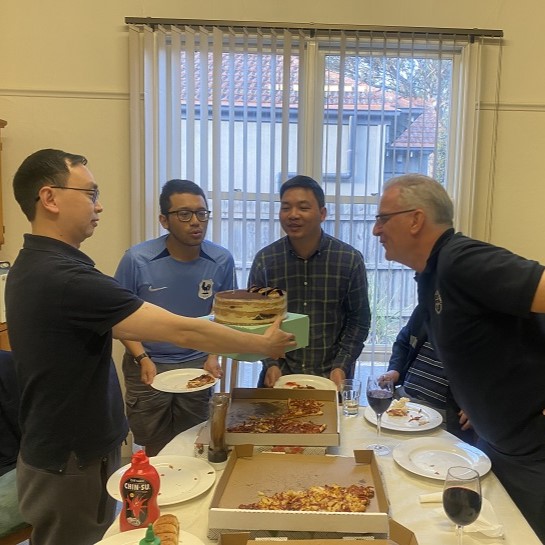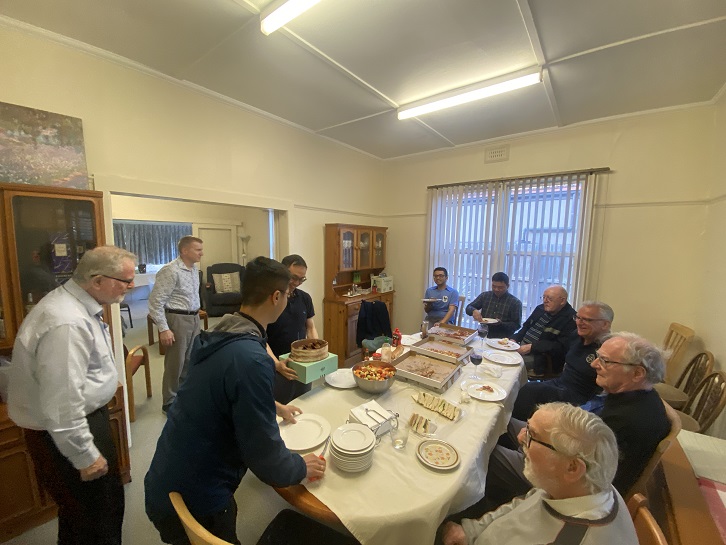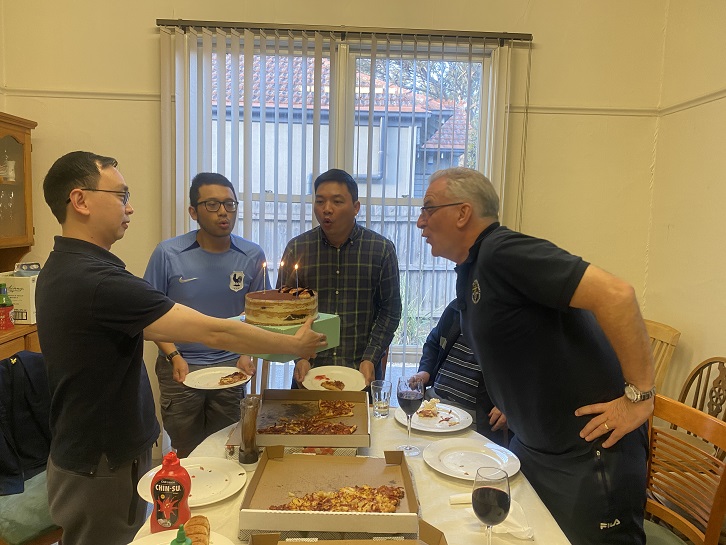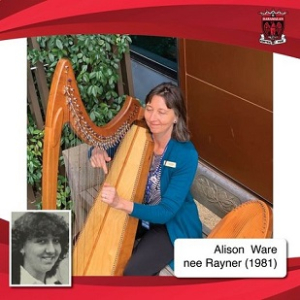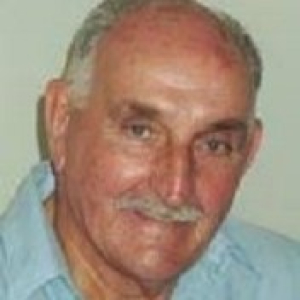Peter MALONE
Goodrich
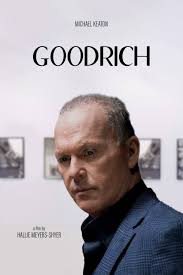
GOODRICH
US, 2024, 110 minutes, Colour.
Michael Keaton, Mila Kunis, Carmen Ejogo, Michael Urie, Kevin Pollak, Vivien Lyra Blair, Danny Deferrari, Laura Benanti, Andie McDowell.
Directed by Hallie Meyers-Shyer.
The title is the surname of the central character with its interesting and evocative implications of both good and rich. In fact, the film could be seen something of an allegory about the rich, gaining the whole world, the danger of losing one’s good, one’s soul.
As we watch Goodrich, we are reminded that many politicians on retirement, sometimes surprisingly early, claim that they need time for being with their families. This film is a strong reassurance that this should be so.
In the opening minutes, Andy Goodrich, another fine performance by Michael Keaton, wakes to find his wife phoning him that she has gone into rehab because of prescription pills addiction. He is shocked. He does not believe it. He has never noticed. Which means that the film is the unmasking of Andy Goodrich, his discovering the self-centredness, self-focus of his life, his career, always busy, taking his family for granted.
And he has nine-year-old twin children coming to realise how much he has been absent from their lives, especially as they question him about their mother, about his own attitudes towards them, the little girl being precociously questioning and observant. He has to find more time to be with them at home. From his first marriage, he has a daughter in her mid-30s, married to a doctor, now pregnant, Grace (Mila Kunis).
Part of the unmasking is his growing realisation of the difficulties in relationship with his daughter, her devotion to him, his downplaying her doctor husband as a nerd, her complete exasperation while he calls on her help and time, finally revealed in a scene of an extraordinary outburst, emotional truth-telling towards her father, saying afterwards that she regretted, not what she said, but saying it out loud.
Then there is the Goodrich Gallery, a boutique gallery in Los Angeles, fostered by Andy for decades, but falling on hard times, money loans, art not selling, then, at one joyful moment, the possibility for all his problems to be solved by getting a contract on the estate of an artist who has died, almost there, but…
There is a great deal of feeling in this film, written and directed by Hallie Meyers Shyer, daughter of two prominent directors, Nancy Myers and Charles Shyer, who made films with some of these family themes.
A reviewer described the film as “endearing”. Andy Goodrich is not always endearing but our invitation to share his self-discovery and emotional honesty with him is endearing. The final image of him is as grandfather holding his newborn granddaughter. There is hope.
- The title, the focus on good and rich? Ultimately which prevailed?
- A piece of contemporary Americana, families, careers, addictions, pregnancies, education?
- Los Angeles setting, the comfortable home and interiors, the art gallery, the rehabilitation centre, the meditation centre, hospital? The musical score?
- The prologue, Andy waking up, the phone call, his wife, the message, his incomprehension, denial, not noticing real situations? Self-preoccupied? His work? Going to the centre, the smiling refusals of admission? Phone calls, letters returned? His wife ringing the children and his answering, her silence?
- The portrait of Andy, his age, his first marriage, his wife leaving, a successful management of a Gallery, Grace as his daughter, her living with her mother, marrying Pete, Andy considering him a nerd, his being a nose and throat doctor, Grace and her pregnancy?
- Andy, his second marriage, the twins, age 9, precocious, the daughter and her observations, her probing questions, the son and his bonding with his father? Andy having to rise to the situation, meals, accompaniment to school, being tardy and being told off, the criticisms of his children, early leaving, late at home, nights away, their reliance on their mother, devotion to her? His reticence about telling the truth, their finding out? Staying home and watching Casablanca?
- The friendship with Terry, his son, the three children playing, Terry as an actor, highly strung, his partner leaving him, thinking that Andy was available, the kiss, the repercussions? Terry and his sons collapse, Andy taking him to the hospital? The Halloween shopping and the collection of the sweets?
- The focus on Grace, her marriage, pregnancy, visits to the doctor, interactions with her father, his calling her Billy, helping him out, minding the children, fending off his comments about Pete, the plan for the hiking, meeting Lola Thomson, going to the breathing session? Andy forgetting to take her to the doctor, her outbursts and truth-telling about his whole life and attitude, later apologising, not for what she said but for saying it out loud?
- Naomi, her sudden return, meaning as a friend with Andy? Love for the children?
- The meeting with his first wife, her friendship, the walk, their daughter in common?
- The Gallery, the financial meetings, the loans, the painting’s not selling, the young artist, Andy and his good relationship with his staff, the young director and the job in Portland, and the longtime friendship and depending on Cy? Andy and his optimism? The prospect of the Theresa Thompson estate, going to the feminist show, approaching Lola, attending the breathing session, the seeming contract, the posters, Lola and her signing with the international company?
- The closing of the Gallery, the party, his farewell speech?
- The possibility of a new life, with sequence, Peter arriving, Andy and his words to Grace, the happy birth, his holding the baby, the symbol of his future, good rather than rich?
Crossing the Line
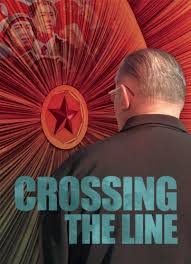
CROSSING THE LINE
UK, 2006, 86 minutes, Colour.
Narrated by Christian Slater.
Directed by Daniel Gordon, Nicholas Bonner.
While this documentary was made in the early 2000s, it continues to be interesting, especially because of the place of North Korea in world politics since the middle of the 20th century and its continued ambitions into the 21st century.
This is a British production, the directors interviewing James Dresnock, the American soldier who crossed the line from South Korea to North Korea in 1952 and stayed there for the rest of his life.
While the focus is on Dresdock and three other American soldiers, there is a great deal of background footage and explanations of Asia the end of World War II, the defeat of the Japanese, the Japanese in Korea, the links with North Korea and China and the newly emerging Communist Party under Mao Tse Tung. There are explanations of the Korean War, the American presence, the dislike of the Americans and their treatment of the North Koreans. There are explanations of the division between the North and South and the consequences.
There are a number of interviews with American officers from Korea at the time, those who had the defectors in their forces, background stories to what it happened, comments on the characters, opinions on their behaviour and the relationships between North Korea and the US, issues of propaganda.
Because North Korea can be so secretive, a film like this where the directors were able to be in the country and freely interview some of the defectors is significant. There are explanations, showing their lives over the decades, visuals of life in North Korea, cut off from the rest of the world, yet promoting English because of its access to technological developments, the regimentation, the vast crowds organised, the goose-stepping military…
But, the focus of attention, is on James Dresdock, willing to be interviewed 50 years after his defection. He gives an explanation of his difficult childhood, parents, orphanages, joining the military, service in Korea, working with other soldiers, the hard life of the soldiers, the drinking, the prostitutes, and his decision to cross the line to North Korea. There are some details of three other men who defected, two soon after Dresdock, one in the 1960s.
Dresdock is very affable in his interviews, smiling, giving explanations, his childhood, what it was like at his age to be in a foreign country, issues of language, culture, race, the treatment by the authorities, the indoctrination and his acceptance of this, then details of his marriages, his children, their American appearance yet their Korean mentality, their education, his role in giving lectures, and, perhaps surprisingly, the involvement of the defectors in the Korean film industry, propaganda films and their playing “ugly Americans”.
Some attention is given to the defector, Charles Robert Jenkins, his wife, a captured Japanese, his eventually leaving career to return to his wife and writing a book about his experiences.
There is a certain sympathy initially for James Desdock, his background, sad experiences, immaturity, and the consequences for living the rest of his life in North Korea. His doctor reveals he is in poor health, the smoking and the drinking. However, from the American point of view, he is a defector, a traitor, working for decades against America and its interests.
Ground Zero
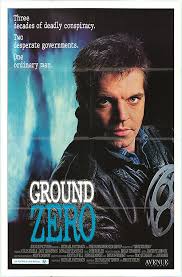
GROUND ZERO
Australia, 1987, 108 minutes, Colour.
Colin Friel's, Jack Thompson, Donald Pleasance, Natalie Bale, Burnham Burnham, Simon Childers, Neal Fitzpatrick, Bob Maza, Alan Hopgood, Peter Cummins, Mark Mitchell.
Directed by Bruce Myles, Michael Pattinson.
The Ground Zero of this film is the side of the atomic tests in Marnga, South Australia, in the 1950s.
Information is given at the beginning of the film about the tests, British secrecy, alleged guarantees of safety by the British, the choice of the site, the repercussions for indigenous people, radiation, deaths.
There is a personal story running through the film, focusing on Colin Friels as a filmmaker, and making commercials, but involved then in the investigation of the nuclear tests, discovering that his father was involved in filming at the time, personal difficulties at home, but becoming more and more involved in the exposure.
There is a very strong supporting cast led by Jack Thompson, aboriginal actor Burnham Burnham, aboriginal actor Bob Maza as a liaison officer, and a number of Australian character actors. Direction by Bruce Myles and Michael Pattinson who was emerging as a feature film director at the time, Moving Out, Street Hero.
In retrospect, the interest in the film is the continued exploration of the nuclear tests, their effects, the questioning of nuclear testing in the 1950s.
- An Australian thriller, based on experiences, nuclear tests, the effect, radiation, aboriginal people? Secrecy, exposure, cover-ups?
- The film from the 1980s, 30 years after the tests? Australian consciousness?
- The background of the Royal commission, the 1980s, the nuclear era, the tests, aboriginal people, exposure and radiation, themes?
- The Panavision photography, the city of Melbourne, intimate sequences, the desert, the sites, the special effects? Old films and news items?
- The title, sites for the explosions, the reality of the tests, the information at the beginning? Facts, interpretation, the list of the dead?
- Introduction, the plane, the radioactivity and suggestions, the news, suppression?
- The personal story, the introduction to Harvey, work as a cameraman, filming the commercial? Melbourne, the snooty neighbours, the flat, the film, the phone, the video, the rat? Harvey at home, relationship with his wife, tensions? With his son? The happy-go-lucky attitude? His relationship with his father?
- The news, his interest, the growing involvement? The effect on him, the further investigations, his father as cameraman?
- The lawyers, the conduct of the Royal Commission, the aboriginal liaison person and his influence? The group in the court, the moment, the home? The issue of traditions, silence about the deaths, the aborigines not counted in the census but only in the wildlife? The witness, the old woman, the description of the fallout cloud? The range of testimonies and the witness of talk about the fallout?
- The British, the pledges that all safety would be provided for? The reality?
- Prosper Gaffney, British, the choosing of the sites, Harvey’s father, the paintings, the aboriginal themes, the bomb of the apocalypse? Charlie, “old Black Bastard”, his blindness, meditation, death and burial?
- Carl Denton, his work with the aborigines, with Gaffney, the mystery death? The aboriginal liaison officer, the talk with Harvey, the film, the court, failure and disbelief, the Harvey’s reaction?
- The film, the deserted base, the open door, the corpses, labelled and backed?
- The personality Prosper Gaffney, the biblical overtones, vengeance is mine, God’s will be done?
- The film as a drama, personal, as exposure of the past, court drama?
MSC Melbourne Community, moving to year’s end
MSC Melbourne Community, moving to year’s end
The community gathered last Friday for the last meeting for 2024. Most of us will be gathering for the special Blessed and Gifted retreat next month at the Community of the Holy Name Spirituality Centre in the Melbourne suburb of Cheltenham (a community of Anglican Sisters).
Hoa has started a pastoral placement at Monivae, Trieu in Box Hill parish.
Four birthdays to be celebrated, Bartha, PP of Moonah who was not with us, Daniel and Long. They shared the birthday cake with our confrere who is with us at Cuskelly House for these months, Chris McPhee. And blowing out the candles.
Photos by Hoa,
MSC Education tradition, Daramalan Alumni, 4 Music Stories
MSC Education tradition, Daramalan Alumni, 4 Music Stories
Over the years, the Daramalan Alumni Facebook page chronicles some of the ex-student achievements. We have posted quite a number of these stories – a tribute to the MSC spirit in education.
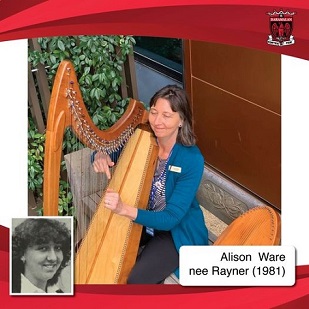
Alison Ware, nee Rayner (1981), Creative Arts Therapist and a Certified Clinical Musician of the Therapeutic Harp Program, provides comfort to patients across hospitals and medical centres in the Canberra region.
The program is entirely patient-centred, with music specifically tailored to individual requirements and chosen to support their health and well-being by providing a quiet space for rest reflection and to facilitate sleep.
Last year alone, Alison visited 386 patients by their bedsides, directed around 130 sessions in wards and common spaces, provided comfort care and end-of-life vigils to 68 individuals.
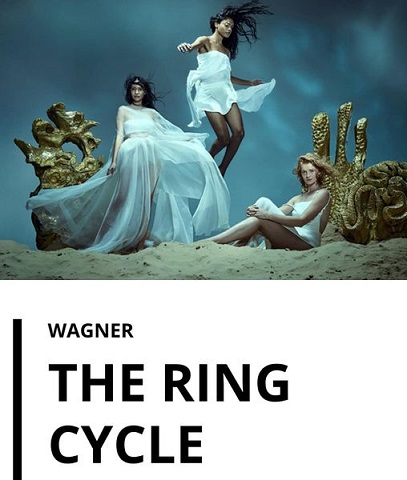
Congratulations to amazing Lorina Gore (1994) who is performing one of the Rhinemaidens in Australian Opera production of Wagner’s Ring Cycle currently happening in Brisbane. Incredible talent!
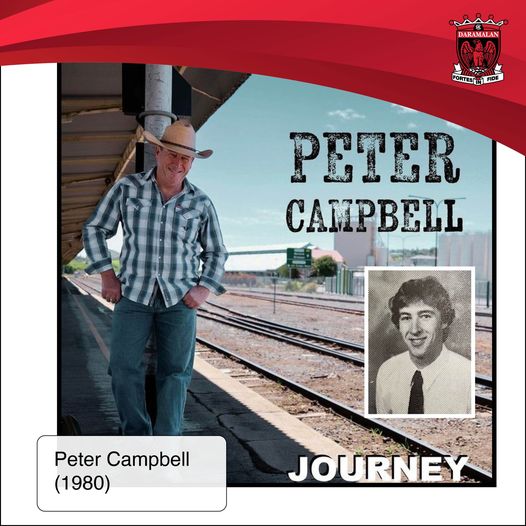
Congratulations to our 1980 Alumni, Peter Cambell, on releasing his new album "Journey". One of the songs, "Don't Come Back" was written by Mark Flynn. Peter played in a covers band with Mark when Peter was in Year 10.
You can find out more about Peter Campbell's music on his professional page: https://www.facebook.com/campbellcountrymusic
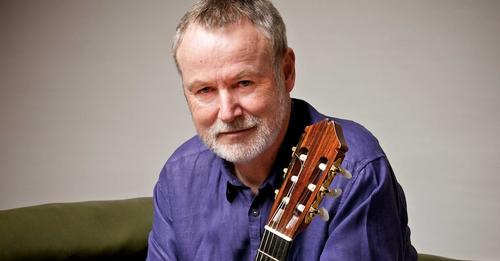
Timothy Kain (1968) a terrific guitar soloist, a duo guitarist and the founder of Guitar Trek, Australia’s unique and pioneering guitar quartet. He was also made a member of the Order of Australia, AM, in June 2013. Tim’s latest CD was released this year; you can find out more information on the musician's website https://timkain.net/main/page_home.html
A significant Australian who taught at Downlands College, poet Bruce Dawe
A significant Australian who taught at Downlands College, poet Bruce Dawe
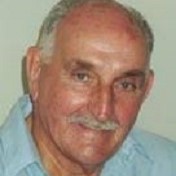
Donald Bruce Dawe AO (15 February 1930 – 1 April 2020) was an Australian poet and academic. Some critics consider him one of the most influential Australian poets of all time. Dawe received numerous poetry awards in Australia and was named an Officer of the Order of Australia. He taught literature in universities for over 30 years. Dawe's poetry collection, Sometimes Gladness, sold over 100,000 copies in several printings.
Bruce Dawe was born in 1930 in Fitzroy, Victoria during 1954, Dawe converted to Catholicism. In 1956, Dawe returned to Melbourne, where he worked as a postman for two years and as a self-employed gardener. In 1959, Dawe joined the Royal Australian Air Force (RAAF). In 1966, Dawe was posted to Malaysia for six months.
Leaving the RAAF in 1968, Dawe began teaching at Downlands College, a Catholic boys college in Toowoomba, Queensland.
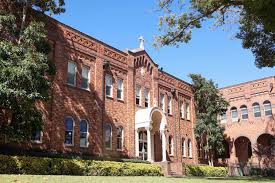
After teaching English and history at the secondary level for two and a half years, he became a tertiary lecturer in English literature at the Darling Downs Institute of Advanced Education (DDIAE) in Toowoomba.
Dawe wrote poetry about ordinary people in modern Australia, their interests in cars, novels, films and other popular items. He also wrote about abortion, environmental degradation, and the treatment of the Australian Aboriginal community.
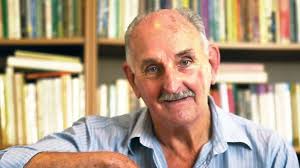
In discussing Dawe's poetry, John Kinsella remarked: Always behind Dawe’s seemingly playful banter with us, his readers and public, is his commitment to sympathy and connection with the less empowered, the disenfranchised, downtrodden, neglected and exploited.
Dawe died in Caloundra, Queensland, on 1 April 2020, at age 90.

He was invited by the editor of Compass Theology Review in 1981 to contribute a reflection on his image of God. He declined to write but sent a poem instead. (And the editor thought he might find a place in a footnote that he was Dear Father…..). You might enjoy the poem.
MY EXPERIENCE OF GOD
Dear Father, I’m afraid I’m going to have to pass
on your kind invitation to write an article on my experience
of God (which is, for me, like being asked to write about
what it’s like to be good at maths or the world best
ocarina-player). Please don’t get me wrong
- I value the compliment, as I would an invite
to a friend’s wedding in Darjeeling,
or to see the sunrise over the Vale of Chamouni
– but these, too, are great things that never happened.
For years now I have sat around waiting for just such
a religious experience as you propose – even pretending disinterest,
affecting agnosticism as a further bait and lure
to the real happening; I have tried sin in a
modestly Augustinian way, practised humility
until I just about had it off perfect, felt the soft nap
of mortality as housewives in a haberdasher’s shop
finger gently the proferred velour, noted, here at the end carnal edge
of night, the meteor-showers of goodness
pelting the ozone layer of the world’s evil,
and the Christ of a thousand flags
enter the box-canyon knowing there is no way out but out,
and being immeasurably cheered by the perpetual recurrence
of the performance…
But – you know how it is with some people
- when one special thing comes along
they are out of town for the day and the vision of the godhead
goes to the bloke next door
- or they’re striking a match and the Burning Bush
and its voice of election
finds a better witness in Moses…
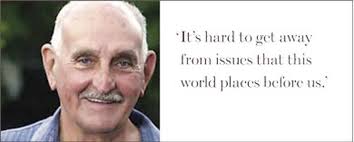
R.M.N.
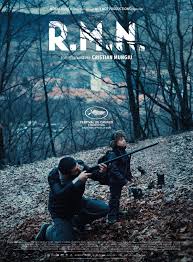
R.M.N.
2022, 125 minutes, Colour.
Marin Grigore Judith State,
Directed by Cristian Mungiu.
The initial of the title is the Romanian versions of MRI. , in fact during the film there is a sequence with an MRI scan, the father of the central character. It would seem that with the title, the prominent Romanian director, Cristian Mungiu (4 Months, 3 Weeks, 2 Days, Beyond the Hills, Graduation) is wanting to do something of a cinema scan on contemporary Romanian society.
This is very much a film for the home audience, the familiarity with Romanian society in the second half of the 20th century, part of the Soviet bloc, the dictator Ceausescu, his downfall, new alignment with the West, member of the European Union. There are also the difficulties of the cost of life, industries, migration throughout Europe for work, the bringing in of migrants workers, and the underlying racial and ethnic prejudices (even supported by the Catholic Church).
The film opens with glimpses of a contemporary Romanian city and there are various vistas of the city, some close-ups of the buildings, streets, as well as scenes in the forest outside.
But, there are some central characters, especially Matthew, some Hungarian background, with a setting in Transylvania and a mixture of Hungarian, German, Romanian origins. He has left work in Germany after disputes in an abattoir, comes home to see his child, a fearful boy, and he spends a lot of his time trying to making tough, not a sissy, taking him hunting, accompanying him to school only so far… He is estranged from his wife, is in a relationship with a woman who is running a company, a bakery, in the town, which is employing Sri Lankan migrants. There is also the issue of Matthew’s ill father.
So, on the one hand, there is a human story with its contemporary overtones. On the other hand, there are the social issues, dramatised in the response to the Sri Lankan migrants, the welcome by the two women in the company, their working in the bakery, some friendly sequences, especially a home meal, cooking Sri Lankan style, songs and dances.
However, very striking, especially one sequence of a town meeting, there are impassioned objections from many of the townspeople, xenophobic comments, challenges to the Mayor, the role of the priest in trying to mediate. This is a long sequence, key to the MRI on the state of Transylvania.
As expected, there are various complications, Matthew and his trying to help his son, the clashes with his wife, the illness and death of his father, his relationship with the woman at the bakery.
There is also a lot of Transylvanian symbolism which may well be lost on many of the audience, the children reenacting songs and traditions, the symbolism of a bear in the forest which terrifies the young boy, symbolic bears who menace people in the town.
For those interested in Romanian cinema, this is a welcome addition to the other films by the director which should be seen.
Apartment 7A
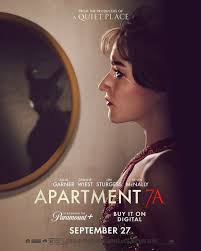
APARTMENT 7A
Julia Garner, Dianne Wiest, Kevin McNally, Jim Sturgess.
Directed by Natalie Erica James.
Many audiences who decide to watch Apartment 7A and who have a love for films and memory for those of the past, will soon begin to realise that this is a reworking of Rosemary’s Baby. This is especially the case when Minnie and Ramon Castavet appear on the scene, and the moon might seem familiar, and the realisation that Dianne Wiest is doing impersonation of Ruth Gordon’s character in Rosemary’s Baby, as is Kevin McNally for Ralph Bellamy’s. Which means then that interest gathers pace as to how this film will resemble the original.
In the final credits, after the credit for screenplay and a credit for story, there is acknowledgement of the novel by Ira Levin.
And, then we realise that this is a prequel. For many audiences, they say that this is not necessary. Rosemary’s Baby stands on its own. However, there was a television sequel, Look at what Happened to Rosemary’s Baby (1976).
The central character, Terry, is played by Julia Garner who has built up quite a reputation in a number of films as well as television series, Fargo. She plays a young dancer from Nebraska, full of ambition, experiencing a fall and injuring her ankle. Feeling sick on the sidewalk, she is befriended by the elderly couple who become her patrons, offering the apartment and all kinds of support.
The film spends a lot of time on the choreography and dance routines, performance and rehearsals, and incorporates a number of popular songs including If my friends could see me now and, especially at the end, seeming rather incongruous and ironic at the final meeting of the coven, Be my baby.
Gradually, the Satanist issues become part of the narrative, substituting the kindness of the elderly couple, even though it does seem somewhat sinister, as well as the apartment block in which they live and its sinister corridors, and the basement the centre for the coming gatherings. Hallucinations, dreams, injuries, and a pregnancy.
There is a 21st-century film and so the issue of an abortion is quickly raised. But there are also Catholic themes and images, Terry going to a church, an encounter with an elderly nun who reveals the truth.
And, while the heroine seems rather ingenuous, she is also fiercely ambitious, making a Faustian pact with the director to be the star of the show, and her name in lights.
After sinister episodes, and the ambiguous behaviour of the elderly couple as well as the director and the taunting co-star who also injures her ankle, twisting her foot, and Terry then becoming the star of the show, there is a finale where Terry takes the initiative to thwartthe ambitions of the coven.
There is a final moment, at the scene of the accident in the street, where Minnie and Roman set their eyes on a potential mother for their ambitions, Rosemary…
- A prequel to Rosemary’s Baby, the basic original story, the variation on the theme, the failure to produce the baby and the need to find another woman?
- The New York setting, Broadway and Theatre, the world of dance? The apartment block, the rooms, the corridors? Rehearsal spaces? The musical score?
- Terry, her story, filling in the background, Nebraska, raising pigs, the slaughter, the effect on her mother, the death of her father? Moving to New York, the opening sequences, looking in the mirror, make up, the dance routine, her joy, the fall and its consequences?
- The aftermath, her going to the auditions, the continued interrogation, having to repeat her movement, the interrogation by Alan, his wanting her to imitate the pigs? Her refusal, his praise?
- Her apartment, her roommate, their friendship, her support?
- Her decision to follow Alan, the apartment block, at the desk, in the street, being sick, Minnie and Roman finding her, helping her, bringing her to the apartment, the next morning? In themselves, sinister, smiling, childless? (And the performances paralleling Ruth Gordon and Ralph Bellamy in the original?) The offer, the friendship, the apartment, Terry settling in? Night date, the couple missing, Alan, the night, drugged, her fantasies in the musical, diabolical presence? The aftermath, discovering her pregnancy, the shock? Discussions with her roommate, going to the abortionist, the dire effect on the abortionist, paralleling Vera and her injuring her foot on stage?
- The finding of the shoe of the previous tenant, asking the concierge about her, her clothes and possessions, the Bible, the indication of Satan, her mysterious death?
- The pregnancy, the discussions with the doctor, the help from the retired judge with the medication? The later appearance in the room, the fright, the knife? The cumulative effect on Terry?
- The rehearsals, the criticisms, Vera and her taunts? Support from Alan? , Vera’s injury, Terry declaring she wanted the role?
- The buildup of terror, after the visit to the abortionist, the injuries? The discussions with Minnie and Roman, the realisation of Roman in the mask? Going to the basement, the discovery of the room, the Satanists? Her going to the church, the Catholic symbols, her meeting the nun, the nun and her terror, revealing the truth, the presence of the Bible?
- Terry, her decision, the gathering in the apartment, the song and the dance routine, the choice of “Be My Baby” for the song? The reaction of the audience, her charming them, her going to the window, her fall? The shock for the group?
- Her falling on the car, the police interrogating the young couple, Minnie and Roman watching – and the move towards the story of Rosemary’s baby?
Bliss/ 2021
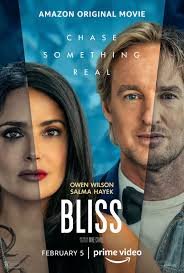
BLISS
US, 2021, 103 minutes, Colour.
Owen Wilson, Salma Heyak, Nesta Cooper.
Directed by Mike Cahill.
This is a film made for streaming in the early 2020s. The response has been significantly divided.
On the one hand, some audiences accepted the story as “realistic” and found it confusing and less than interesting. On the other hand, the promotion was in terms of science-fiction. But many consider this misleading.
The film does start realistically, Owen Wilson as Greg, an artist, divorced, phone calls from his daughter to attend her graduation, his wariness about meeting her mother, sketching ideal homes and scenery, called in by his boss, fired. In the confrontation with the boss, he pushes him, the boss hitting his head on the desk, dead, and the panicking Greg standing the boss of the window and drawing a curtain and escaping.
Then eerie happenings, sometimes described as “magical realism”. Greg encounters Isabel, Salma Hayak, who seems to have strange powers, gradually explaining that not everyone was real, that people and situations were created by computers. If audiences accept this explanation, then what follows is logical while always unexpected.
But, Greg is also on some medication and the suggested interpretation of the film is that it highlights the results of medication, mental disturbances, loss of the sense of reality.
Isabel is able to make people appear and disappear, even bring the murdered boss to life. While Greg is reluctant at first, he follows Isabel, finding her living on the street, artwork, elaborate setup, searching for food. It then becomes something of a fantasy romance.
Meanwhile, in the background, Greg’s son and daughter, their response to their missing father, the daughter’s search for him, final encounters, his recognising her not, his going off into his own strange world, lacking the support from Isabel, a world of bewilderment.
Audiences interested in the unusual (though with a standard performance in his own style and accent by Owen Wilson), there is much to tantalise. Two of the director’s earlier films might repay fans of this film, Another Earth and I, Origin.
Madre
MADRE
Spain/France, 2020, 128 minutes, Colour.
Marta Nieto, Jules Porier, Alex Brendemuehl, Anne Consigny, Frederic Pierrot.
Directed by Roderigo Sorogoyen.
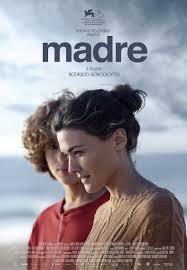 Madre is a Spanish/French production. The story is both Spanish and French. The film had many award nominations and many wins, especially for the performance of Marta Nieto as Best Actress. She has a brooding, grieving screen presence.
Madre is a Spanish/French production. The story is both Spanish and French. The film had many award nominations and many wins, especially for the performance of Marta Nieto as Best Actress. She has a brooding, grieving screen presence.
The film is an amplification of a short film made by the director, also called Madre. Some of the short film serves as a prologue to this feature. And the prologue focuses on Elena, a young mother whose child disappears. Grieving for her and her husband, and her husband leaving.
10 years later, and the scene shifts from Spain to the coast of France near the border. Elena is working at a restaurant, managing, customers including tourists in the summer season, a boyfriend. But, she spends a lot of time walking along the beach, brooding. These scenes serve as something of a chorus to the action, the vastness of the sand, the vastness of the sea, her being alone figure, isolated, but searching.
Amongst the tourists for the season is a French family, living in something of a château on the outskirts of the town. They have a young teenage son, the equivalent of age of /elena’s lost son. The rest of the plot does fulfil some expectations, Elena will fascinated by the boy, following him, his being dissatisfied at home with his own parents, coming back to her, the forming something of a bond, substitute mother and son, to the dissatisfaction of his parents, Elena’s confrontation with his father.
And, there is an interlude where Elena’s husband comes to visit her again, reliving the past, failures, little hope for the future.
But, as expected, there is no final resolution, leaving the audience to reflect on Elena and her grief and yearning for a child, the dissatisfactions of the young man, the consequences for the future.
- The title? The director’s amplifying his previous short film? Using it is a prologue?
- The mother themes, the focus on Elena, her own son, his death? Her relationship with Jean? Jean and his own mother and his place in the family?
- Spanish story, French story, the coast near the border? The visuals of the coast, the beach, the town, the restaurant, the mansions and grounds, the countryside? The musical score?
- The prologue, Elena and her husband, the relationship, her son, his disappearance? The impact on each?
- 10 years later, Elena and her still grieving, older, from Spain to France, working at the restaurant, managing, the customers, having a boyfriend? Her ordinary way of life, dealing with customers? So much of her time walking along the beach, grieving, hoping?
- The holidaymakers, the family, the parents, affluence, style, Jean, the other members of the family, the staff? Their way of life, expectations?
- Jean, his age, his range of friends, the holiday? The encounter with Elena? Her following him, his seeing it, the effect, the impact on her, imagination and hopes?
- His visit to the restaurant, his feeling that Elena was stalking him, their talking, bonding, the effect on her, the effect on him?
- The visit to the house, polite welcome, awkward situations, the reactions, the mother, the father and his discussion with Elena?
- The narrative exploring what was happening to each of them, Elena and her needs, indulging her fantasy and hopes? The effect on Jean, accepted, potential alternate mother figure?
- The visit from her husband, the talk, some reconciliation or not?
- The resolution, the clarity the situation, Elena and her motivations, the consequences?
